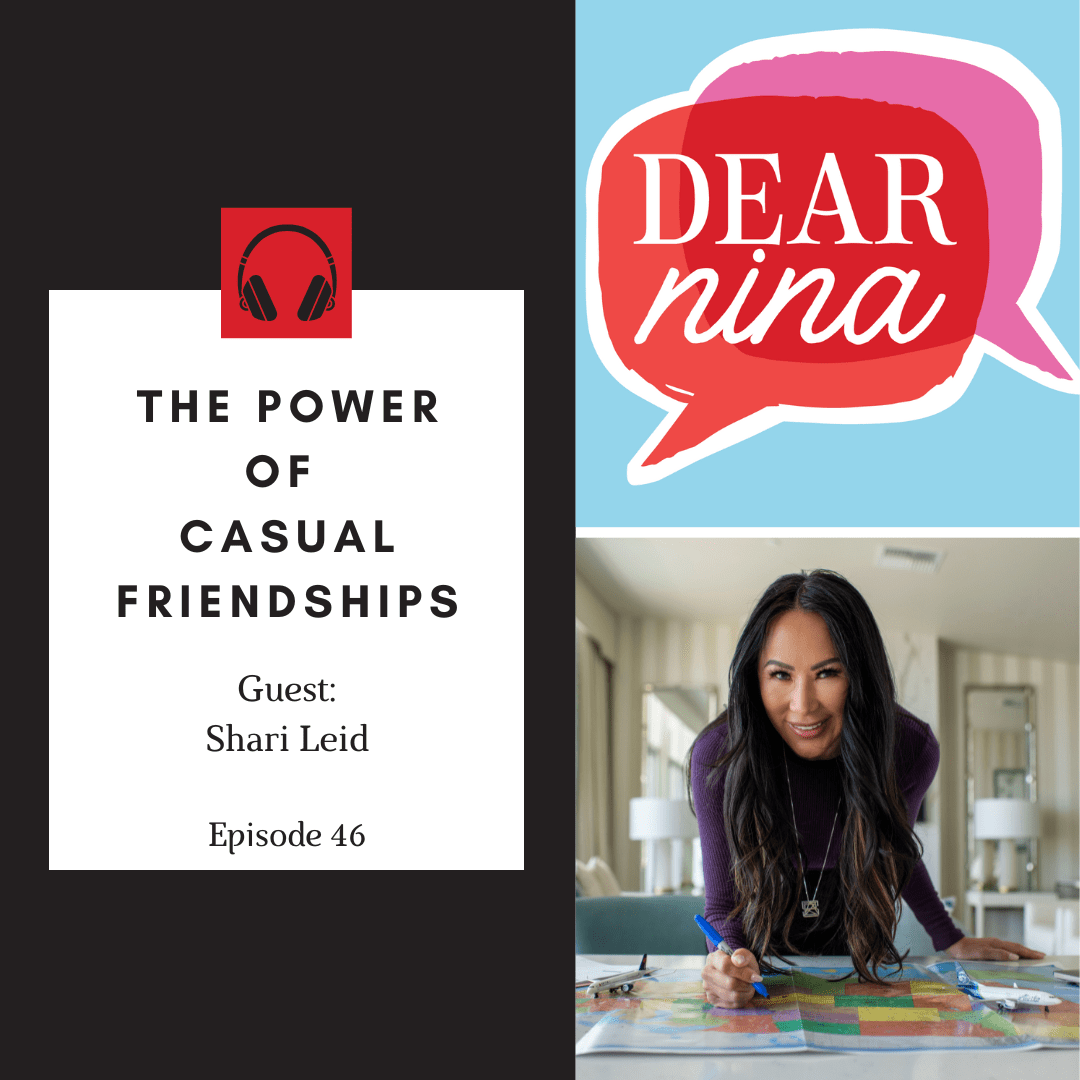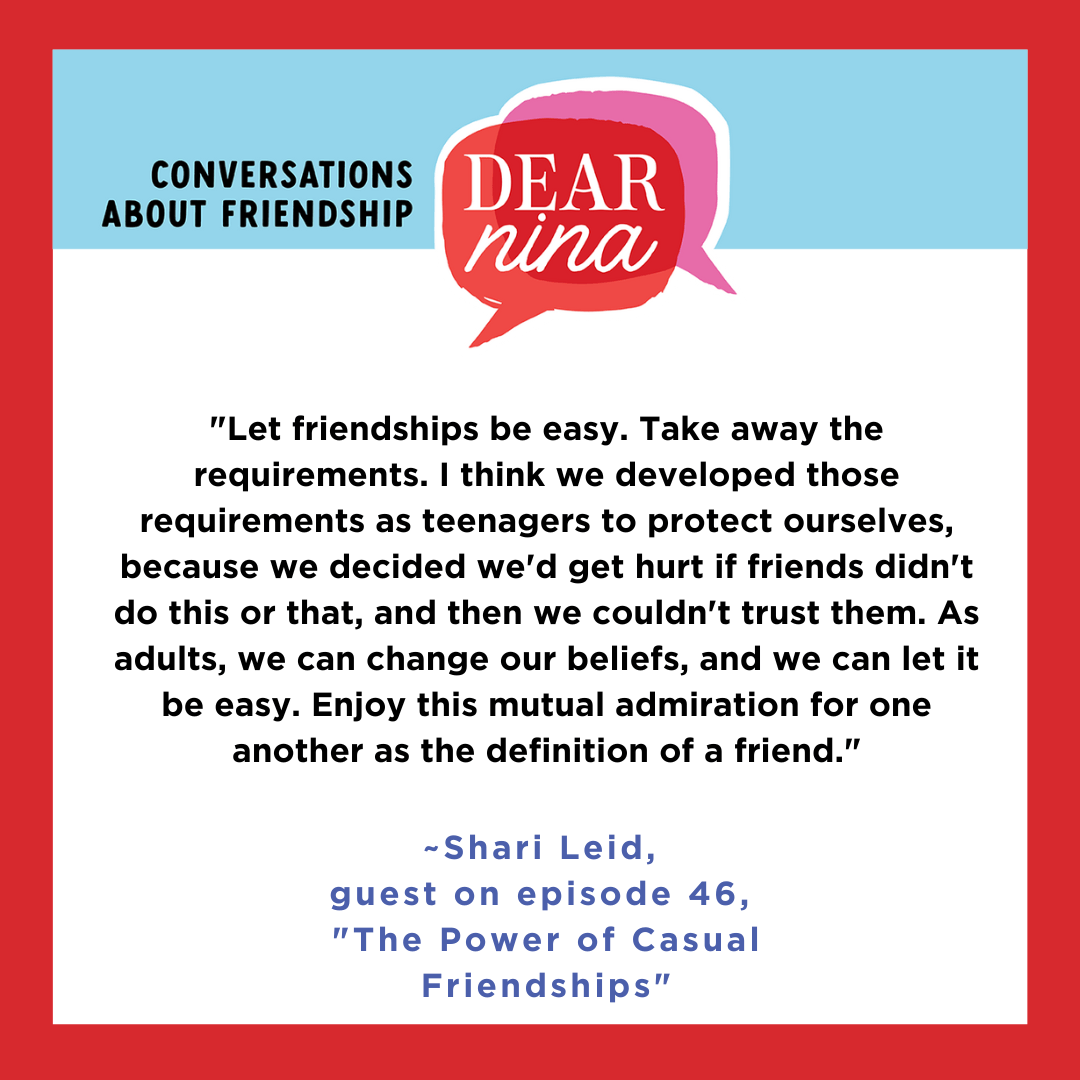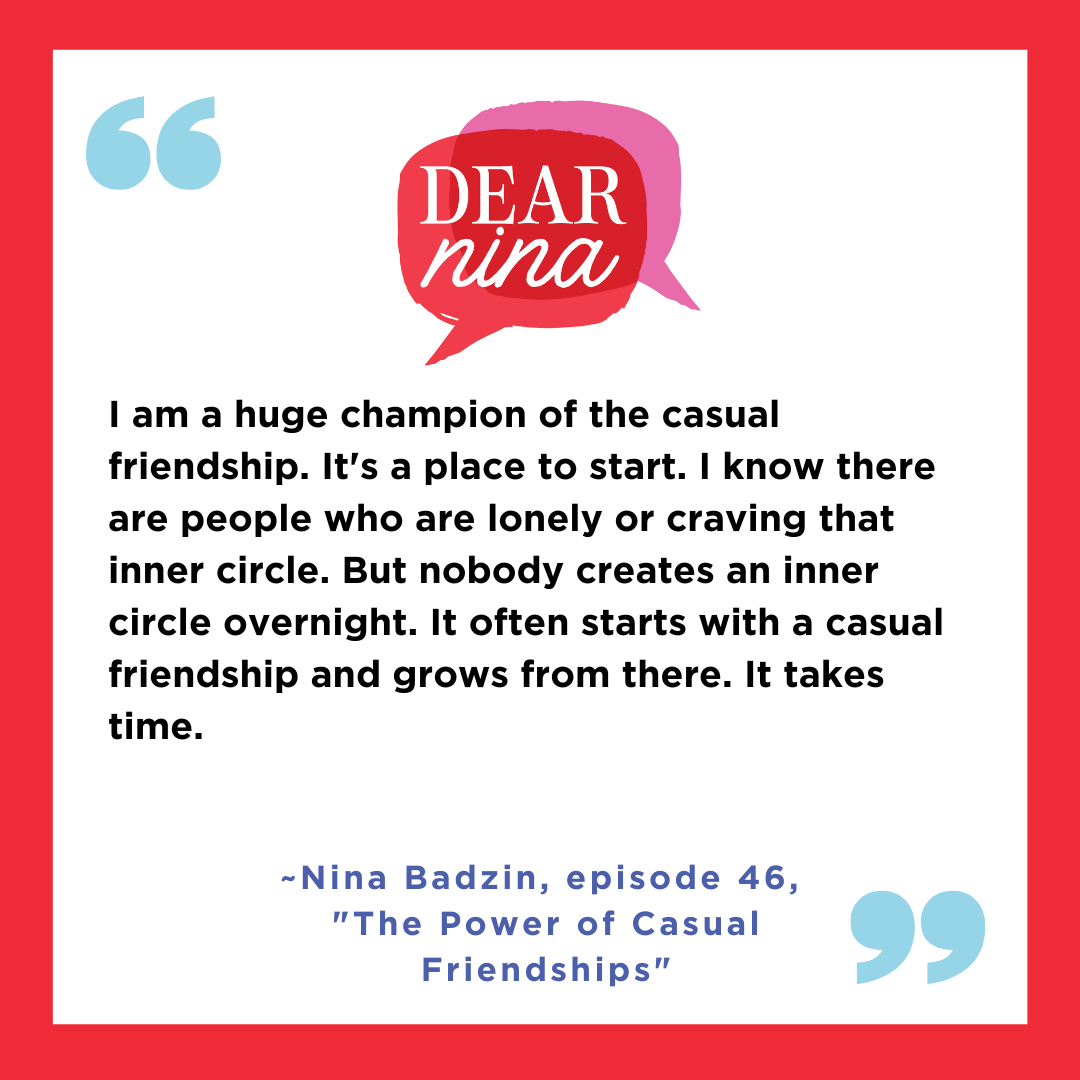The Case For Lowering the Bar on Friendship
This week’s episode with guest, Shari Leid, focuses on wisdom she’s gained after meeting with 144 of her friends. Our episode makes the case for the casual friendship. We also talked about expanding your friendship network by putting yourself out there to connect with new and old friends, giving friends grace, having intentional conversations to deepen friendships, and considering whether your “bar for entry” to friendship is too high.
FIND EPISODE #46 ON APPLE PODCASTS, SPOTIFY, OR ANYWHERE YOU LISTEN TO PODCASTS!
Meet Guest, Shari Leid

Detailed Highlights from my conversation with Shari:
Meeting with 144 Friends
Nina: Is your bar for friendship too high? What if one issue in your friendship life, if you’re looking to have more friends or just have a more robust social, is that your bar is too high. I was inspired to ask this question after reading an article in The Huffington Post by author Shari Leid. The title of the article was, I Interviewed 144 of My Girlfriends About Our Friendships and What I Found Changed My Life. Of course, the natural next question is 144 friends!? That is a lot. And Shari is here to explain what inspired her to embark on this friendship adventure.
Shari: I started between my 49th and 50th birthday, those big milestone birthdays that you feel like you need to do something significant. And I decided, during that year, I was going to meet with 50 of my girlfriends and sit down with them for the purpose of letting them know what they mean to me and what I’ve learned from them with the belief that everyone we meet is our teacher and our student. And this idea came to me after attending a girlfriend’s memorial service where people were talking about how much she affected their lives. And it made me sad because they were saying these things about her, but they didn’t say these things to her.
And it wasn’t just me saying, I like you, I admire you. It was things like, What you taught me when I first met you? You greeted me so warmly that I realized that’s how I want to greet other people. Something as simple as that to maybe something more grand I felt that this person taught me. It really made me reflect on the women in my life.
Nina: I love how you said a specific example about somebody—the way they greeted you. Sometimes we don’t know what we have learned from our friends until we really sit down and think about it.
Shari: That was my process for the first 50 women. I quickly wrote down a list of 50 women who I was friends with at some level. Some were more recent acquaintances, some were lifelong friends. But for some reason these names jumped out at me and I didn’t know specifically at the time I wrote the list, what I had learned from them. The week I was meeting with them, I would sit down and think about our friendship because I wanted to be correct with what I was saying. I wanted to deliver my message in a way that felt meaningful and also made sense to them. So I was very deliberate in what I was saying and what I learned from that specific person that stood out to me.
The Definition of a Friend
Nina: I want to read a quote from your own article: “When I share this journey, the first question I’m often asked is, how do you have 144 friends? Followed by, I can only come up with maybe 10 or so friends that I’d even consider sitting down with to have these types of conversations. My response is simply, my friendship bar is low. . . ”
I don’t know that I would have 144, but I would have a lot more than 10 because I share with you that not everybody has to be the best, best, best friend or the person you’re going to call at 2:00AM. It would be very limiting to put everybody up to that standard. Maybe my friendship bar is also a little lower. And maybe it’s I just love people and I think you do too. I really like to get to know people. I have to work hard to make sure I’m not conducting an interview when I meet somebody. I can hear myself asking question after a question. Not because I think I have to. I want to know. I’m curious, but sometimes when you’re not getting those questions back, you kind of have to be like, okay, is this person uncomfortable? Am I over-asking?
But anyway, I got us into a lot of topics. Let’s go back to your quote. When people respond to you, and I knew that would happen even before I read that quote in your piece when I saw the title. I knew people would say, “How is that possible?” So let’s hear a little bit about.
Nina: I want to read a quote from your own article: “When I share this journey, the first question I’m often asked is, how do you have 144 friends? Followed by, I can only come up with maybe 10 or so friends that I’d even consider sitting down with to have these types of conversations. My response is simply, my friendship bar is low. . . ”
I don’t know that I would have 144, but I would have a lot more than 10 because I share with you that not everybody has to be the best, best, best friend or the person you’re going to call at 2:00AM. It would be very limiting to put everybody up to that standard. Maybe my friendship bar is also a little lower. And maybe it’s I just love people and I think you do too. I really like to get to know people. I have to work hard to make sure I’m not conducting an interview when I meet somebody. I can hear myself asking question after a question. Not because I think I have to. I want to know. I’m curious, but sometimes when you’re not getting those questions back, you kind of have to be like, okay, is this person uncomfortable? Am I over-asking?
But anyway, I got us into a lot of topics. Let’s go back to your quote. When people respond to you, and I knew that would happen even before I read that quote in your piece when I saw the title. I knew people would say, “How is that possible?” So let’s hear a little bit about.
The Power of Casual Friendships
Shari: That title and 144 friends did not phase me at all until I saw the reaction to it. There were a lot of people that reacted to the title without reading the article itself, because it had nothing to do with the number. It saddened me because I thought, wow, no wonder people feel lonely. No wonder people think friendships are hard. No wonder friendships end, and no wonder there’s so much stress around friendships and anxiety and how I look, how I show up, because if we say every friendship has to be at this level . . . granted, we do need those people that are the ones that we can call up when we’re stuck and we know that they’re gonna be there for us. People we can share our most intimate secrets with, yes, we do need those relationships in our life, but we also need the casual friendships. In fact, it’s been shown in studies, especially when you look at older adults, casual friendships add to the quality of life.
If we define friendships as being something so great and so deep and so profound, then we lose out on the casual relationships that enhance our daily life. And we learn so much from one another. As you mentioned, when you meet somebody, you want to ask all these questions because we are better collectively together.
Nina: Yes, I am a huge champion of the casual friendship. I’m always advocating for that. It’s a place to start. I know there are people out there who are lonely and people who don’t have that inner inner circle and are craving it. But nobody becomes an inner circle friend immediately. It just does not work like that. Nobody becomes your number one person overnight, and it has to start with a casual friendship. It takes time.
Being Open to New Types of Friends
Nina: I was struck by the range of friends you had in age and background.
Shari: Yes, I feel very fortunate that I live in an area where that’s available to me. I grew up in the Seattle area. I’ve gone to college. I went to law school. I’ve worked in various jobs, so I’ve had the opportunity to meet women of all ages, all races, religious, political backgrounds, different economic levels, and so on. I’ve kept those women in my life. I still call them my friend. My college friends, my high school friends. If we run into each other , at the store, I’d say, Hey, you know, this is my friend from high school. . .
Nina: Well, I have another theory about that for you in reading your piece. Something that really struck me was, I don’t remember the exact words, but I was left with the feeling that you don’t let one difference in background, a difference of opinion cause a wedge, which sadly is getting rare.
Shari: Over the past several years I’ve seen that become even more of a problem. During the pandemic, we had to figure out who we were safe with physically. Our physical bubbles got small at least for a while. You briefly touched on the 50 State Project I’m doing. Part of that is to be able to expand those bubbles again.
Nina: I think I would love that kind of project. It’s a microcosm of how to expand your network. I get these letters from people who—maybe they’ve moved, or for whatever reason they’re ready for a shake up in their social life. I hear from all kinds of people, all ages, and oftentimes they want to know how to spread out the social life a bit, and I think this is a version of that. Yours involves travel. If you could do something like this involving travel, imagine what you could do in your own town. It doesn’t have to be 50 people. It’s about being really vulnerable and saying to the people you’re already connected with— I am looking to meet more people. Is there someone you think I would get along with? I’m not saying it’s easy to do.
Shari: Yes. And what surprised me about this is how willing people are to meet with me. I mean, most of them didn’t know me. It’s also testing my own beliefs. I grew up not traveling. I’m Asian American and my parents were interned during World War II for being Japanese American. My dad had an idea that it wasn’t safe for us to really travel. So I grew up not traveling, and just like kids do, I took on some of his beliefs. And so this is also questioning my own beliefs, reaching out to these women, women who are very different from me in many ways, and many who may never have shared a meal with an Asian person before. I have been so open and willing to meet with me because I asked.
If you make the first move one, what’s the worst that can happen? Something. miraculous could happen.
Nina: I think the average person does not like to push themselves because rejection is scary. But I love what you said, Look, what’s the worst thing that can happen?
Giving Friends Grace
Nina: You wrote a little bit about how there were some conversations you had with closer friends and yet you still in those conversations, you learned some new things.
Shari: There is something really special about these intentional meetings that helps deepen friendships. Being intentional about it really makes a difference. The second book was Make Your Mess Your Message. I had a girlfriend who I thought was a little, maybe, I would use the word, flaky, in the sense that I couldn’t count on her. Maybe she’ll show up for a party. Maybe she wouldn’t. And sometimes it’d grind on me, especially being such a schedule-oriented person. I thought, well, she’s not organized, you know, whatever it is.Then I sat down and talked to her. I found out that since her teenage years, she has suffered from depression and anxiety and literally talks herself out of bed every day. I’ve known her for a long time, and people might say, well, why don’t you know this about her? Because this isn’t something she typically shared with friends. She’s learned how to deal with it. It’s her personal journey and for her to talk and share it makes it worse that people are looking for that anxiety or depression so she usually doesn’t talk about it. But we sat there and we talked about it. She helped me understand anxiety and depression from her experience. All of the sudden, this woman that I thought was not reliable—I’m realize that’s one of the strongest friends I have. I started thinking about all the times she showed up and how she brought that energy and made people laugh. I just look at her so differently now and with so much more appreciation. Not that I wasn’t appreciative of her before. It’s just a different level now. It’s because we had that conversation.
Nina: This brings us back to something I said earlier too, which is, you know, maybe sometimes people struggle with their friendships more than necessary because we don’t give each other a lot of breaks. And I mean, it sounds like you had given her a break. It’s not like you broke up the friendship, but you had this really honest conversation with her and were able to appreciate her on a different level. And I just love that.
Let’s connect!
- Here’s my Substack newsletter about friendship & more
- JOIN the Dear Nina Facebook group
- Ask an anonymous question
If you like what you’re hearing, please tell a friend!
Also, if you can rate and/or leave a review on Apple Podcasts, I’d be so grateful.
Latest posts by Nina Badzin (see all)
- Dear Nina in The Guardian - May 1, 2024
- Overtalking, Undertalking, and Lessons for Friendships in the Art of Storytelling - April 30, 2024
- Dear Nina in The Wall Street Journal - April 27, 2024
- 5 Friendship Issues to Consider Addressing with a Therapist - April 17, 2024




